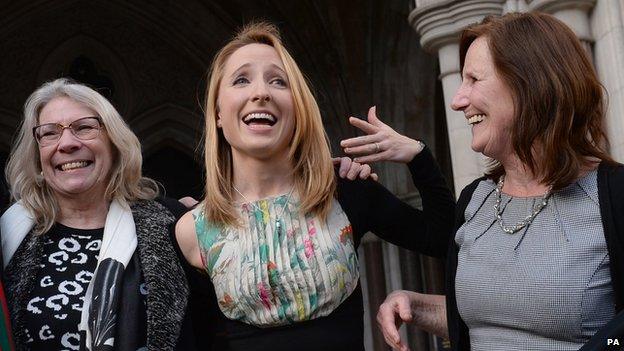Frozen sperm fight ends in victory
- Published

Beth Warren with her mother Georgina Hyde, far right, and mother-in-law Helen Brewer
A widow's legal battle to keep her dead husband's frozen sperm is finally over after the fertility regulator said it would not take the case back to the courts.
Last week, the High Court backed Beth Warren's case to stop the sperm being destroyed by April 2015.
The Human Fertilisation and Embryology Authority kept the door open to appeal, but now says it accepts the verdict.
Her husband had the sperm frozen before starting cancer treatment.
But 32-year-old Warren Brewer, a ski instructor, died of a brain tumour in February 2012.
The couple, who were together for eight years, married in a hospice six weeks before his death and she subsequently changed her surname to Warren.
Mr Brewer had repeatedly made clear that his partner, now 28, should be allowed to use his sperm in the event of his death.
But he had not been given the opportunity by the fertility clinic to store the sperm for a prolonged period.
'Over the moon'
The case went to the courts, but in her judgement, external, Mrs Justice Hogg said: "The evidence indicates that both Mr Brewer and his wife were in agreement. He wanted her to have the opportunity to have his child, if she wanted, after his death."
She ruled that it was "right and proper, and proportionate" to allow the sperm to be kept until at least April 2023.
Mrs Warren, from Birmingham, said she was "over the moon" and "elated" with the decision.
But the HFEA immediately said it was seeking leave to appeal against the decision.
Sally Cheshire, from the HFEA, said: "Seeking leave to appeal may have appeared unsympathetic to Mrs Warren's very regrettable situation, but we owed it to future patients to think carefully about the implications of a complex legal judgement.
"We didn't want Mrs Warren's deserving and highly unusual case to pave the way for other cases where the wishes of the deceased patient are much less clear.
"Fortunately, we think we can guard against any such cases without having to appeal."
The organisation said it would write to fertility clinics to ensure they kept clear records of patients' wishes.
Mrs Warren's lawyer, James Lawford Davies, said: "It is unfortunate that it was ever necessary for Beth to go to court in circumstances where Warren's wishes were so clear.
"Along with the rest of the legal team, I am delighted for Beth and very pleased that her two year struggle has at last come to an end."
- Published6 March 2014
- Published4 December 2013
- Published4 December 2013